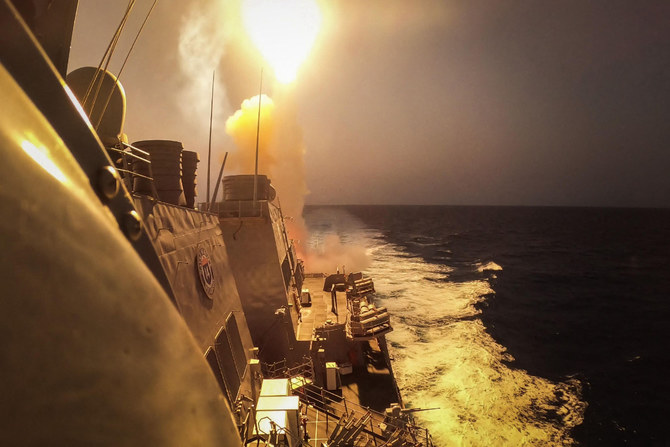WASHINGTON: The US military fired another wave of ship- and submarine-launch missile strikes against Houthi-controlled sites Wednesday, US officials said, marking the fourth time in days it has directly targeted the group in Yemen as violence that ignited in the wake of the Israel-Hamas war continues to spill over in the Middle East.
The strikes followed the official announcement that the US has put the Houthis back on its list of specially designated global terrorists. The sanctions that come with the formal designation are meant to sever violent extremist groups from their sources of financing.
The officials spoke on the condition of anonymity to discuss details that have not been made public yet.
Despite the sanctions and military strikes, including a large-scale operation Friday carried out by US and British warships and warplanes that hit more than 60 targets across Yemen, the Houthis are continuing their harassment campaign of commercial and military ships. The latest incident occurred Wednesday when a one-way attack drone was launched from a Houthi-controlled area in Yemen and struck the Marshall Islands-flagged, US-owned and -operated M/V Genco Picardy in the Gulf of Aden.
The US has also strongly warned Iran to cease providing weapons to the Houthis. On Thursday a US raid on a dhow intercepted ballistic missile parts the US said Iran was shipping to Yemen. Two US Navy SEALs remain unaccounted for after one was knocked off the vessel by a wave during the seizure and the second followed the overcome SEAL into the water.
On Wednesday, Pentagon Press Secretary Maj. Gen. Pat Ryder said the US would continue to take military action to prevent further attacks.
“They are exploiting this situation to conduct attacks against the ships and vessels from more than 50 countries ... around the world. And so we’re going to continue to work with our partners in the region to prevent those attacks or deter those attacks in the future,” Ryder said.
There have been several incidents since the Friday joint operations. The Houthis fired an anti-ship cruise missile toward a US Navy destroyer over the weekend, but the ship shot it down. The Houthis then struck a US-owned ship in the Gulf of Aden on Monday and a Malta-flagged bulk carrier in the Red Sea on Tuesday. In response Tuesday, the US struck four anti-ship ballistic missiles that were prepared to launch and presented an imminent threat to merchant and US Navy ships in the region.
Hours later, the Houthis claimed responsibility for the attack on the Malta-flagged bulk carrier Zografia. The ship was hit, but no one was injured and it continued on its way.

























